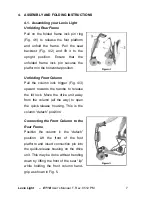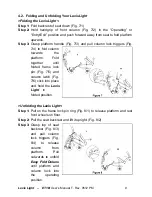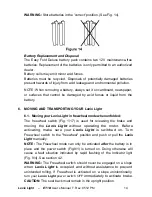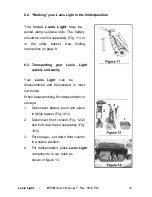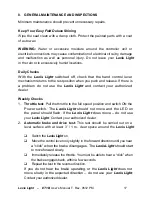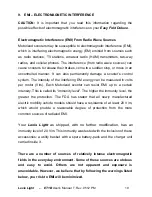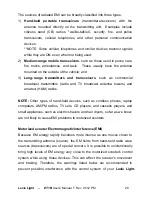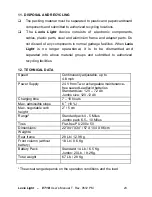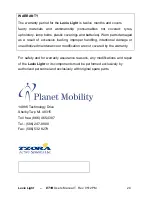
Lexis Light
–
ET1B
User’s Manual T. Rev. 0512 PM 20
The sources of radiated EMI can be broadly classified into three types:
1)
Hand-held portable transceivers
(transmitters-receivers) with the
antenna mounted directly on the transmitting unit. Examples include
citizens band (CB) radios, "walkie-talkies”, security, fire, and police
transceivers, cellular telephones, and other personal communication
devices.
**NOTE: Some cellular telephones and similar devices transmit signals
while they are ON, even when not being used;
2)
Medium-range mobile transceivers
, such as those used in police cars,
fire trucks, ambulances, and taxis. These usually have the antenna
mounted on the outside of the vehicle; and
3)
Long-range transmitters and transceivers
, such as commercial
broadcast transmitters (radio and TV broadcast antenna towers) and
amateur (HAM) radios.
NOTE:
Other types of hand-held devices, such as cordless phones, laptop
computers, AM/FM radios, TV sets, CD players, and cassette players, and
small appliances, such as electric shavers and hair dryers, so far as we know,
are not likely to cause EMI problems to motorized scooters.
Motorized scooter Electromagnetic Interference (EMI)
Because EM energy rapidly becomes more intense as one moves closer to
the transmitting antenna (source), the EM fields from hand-held radio wave
sources (transceivers) are of special concern. It is possible to unintentionally
bring high levels of EM energy very close to the motorized scooter’s control
system while using these devices. This can affect the scooter’s movement
and braking. Therefore, the warnings listed below are recommended to
prevent possible interference with the control system of your
Lexis Light.
Содержание Easy Travel Lexis Light
Страница 1: ...Lexis Light USER S MANUAL...
Страница 2: ...Lexis Light ET1B User s Manual T Rev 0512 PM 2...


